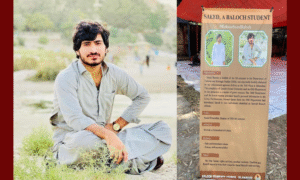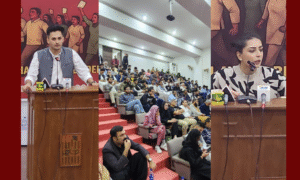Munir Uddin
The outbreak of this pandemic initially brought all activities of the world, be they economic, political or educational, to standstill, at least for some time. Having realized the reality of living with it for a long time, new ways to run the affair of the world have been adopted, which is appreciable. In the face of this pandemic all educational institutions were shut down and lockdown was imposed to contain it from spreading. Students were hard hit by this pandemic and subsequent lockdown. Many university students — from peripheral areas of interior Sindh, erstwhile FATA, Balochistan and KPK — who were residing in hostels, had to leave for their homes.
The government announced lockdown was followed by the clamour of online classes from universities. In the time of such exigency, online classes seem pertinent and universities must be appreciated for such initiatives, but first it is necessary to glance at the effectiveness of online classes.
Online classes were started abruptly without taking into account the issues of the other students who had no access to internet services. This fact cannot be denied that a good chunk of university students comes from such marginal areas, that are underdeveloped and where basic facilities of life are almost nonexistent. When basic facilities are unavailable how can students get online classes without internet services? Educating students in this way proved to be exclusive for it was able to entertain those students who had good internet service.
Reaction came from the students who had weak or no internet services and a campaign was launched to cancel online classes. Soon the resistance was reinforced and joined by the students who were taking online classes. Online classes proved to be unproductive and fruitless, for both students and teachers were unfamiliar with the new technology. And those students who took online classes, could not get any benefit from it. In the face of the resistance from students, some universities had to postpone online classes. By holding back online classes, universities tried to show that special attention is given to improve internet services and make faculty members familiar with new technology, but all attempts have proved to be claims only. Online classes have been started again and the problems, due which classes were postponed, are still unresolved.
Given the current economic crisis, followed by the pandemic, HEC has not yet announced any relief for students. They are doomed to pay their university fees. As explained above, the majority of students are unable to take online classes and those who are taking it, are unsatisfied with it. Despite all these facts, neither the government nor the HEC has made any decision of the reimbursement of university fees. Imran khan, who claimed to be youth leader and promised to improve the education system, is now paying no heed to it. In fact Imran Khan’s government indifference to education can be comprehended by its recently announced budget in which the higher education budget has not been significantly increased.
Today protests can be seen all over Pakistan against all these exploitations. Students can be seen protesting in front of the HEC office against all these draconian measures. Students in FATA and Balochistan are on hunger strike. Government and HEC both are ignoring the voices of students instead of listening to them and finding solutions to their problems. If their grievances are not redressed timely harsh resistance will have to be faced. In this fast-moving world, if we are to earn prestige and self-respect we will have to contribute for the betterment of this world, and this can only be done by educating our youth.
The Students’ Herald News Desk focuses on reporting the latest news regarding student politics and campus updates to you.
The News Desk can be reached at admin@thestudentsherald.com




